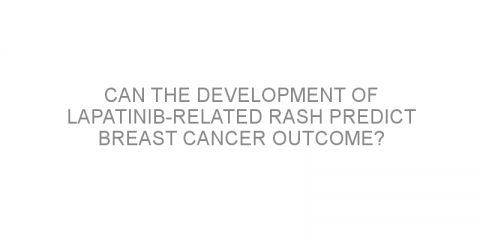In a nutshell This study investigated how the early development of a rash in treatment with lapatinib (Tykerb) impacts survival outcomes in breast cancer. This study concluded that early development of rash may indicate the patients who will benefit more from lapatinib. Some background Lapatinib is a drug which targets epidermal...
Read MoreCurrent treatment status-Did not start treatment yet Posts on Medivizor
The use of MR imaging to predict invasive breast cancer prognosis
In a nutshell This study investigated the use of magnetic resonance (MR) imaging as a prognostic tool in primary breast cancer (BC) patients. The study concluded that MR imaging can identify features which can be used to help predict the risk of distant metastasis (cancer spread to other areas) in patients. Some background Between 20-30%...
Read MoreFactors that affect treatment selection in early-stage classical Hodgkin lymphoma
In a nutshell This study examined factors important in treatment selection for early-stage classical Hodgkin lymphoma. Researchers reported that cancer markers, age, and tumor location as well as gender, ethnicity, distance to facility, and type of insurance affected treatment selection. Some background Classical Hodgkin lymphoma is the most...
Read MoreThe impact of cancer-related fatigue on Hodgkin lymphoma patients and survivors
In a nutshell This study determined the impact of cancer-related fatigue on Hodgkin-Lymphoma patients and survivors. The authors concluded that fatigue particularly affected social integration. Some background Hodgkin-Lymphoma (HL) patients and survivors can experience persistent cancer-related fatigue. Reports of fatigue occur 2.5 to 3...
Read MoreBreast-conserving treatments found to be safe and effective in certain patients
In a nutshell This study investigated the factors that can lead to complications after breast-conserving surgery (BCS) and intraoperative radiotherapy (IORT). Some background BCS removes the breast cancer but not the breast itself. IORT may be used during BCS. If cancer returns it is usually near the site of the original tumor. IORT delivers...
Read MoreAre end-of-treatment PET scans necessary?
In a nutshell This study investigated whether end-of-treatment PET scans could be left out if the mid-treatment scans were negative (no cancer activity). The authors concluded that the end-of-treatment scans were essential, even in patients with negative interim results. Some background Positron emission tomograpy (PET) scans are used to...
Read MoreABVD versus Stanford V chemotherapy for early-stage, bulky Hodgkin lymphoma
In a nutshell This trial compared the outcomes of ABVD and Stanford-V chemotherapy in patients with stage I or stage II bulky Hodgkin lymphoma. The authors concluded that both treatments were equally effective. Some background Hodgkin Lymphoma is a cancer of the lymph system. Patients with bulky disease have tumors larger than 10 cm....
Read MorePET-scans and treatment options in early-stage Hodgkin lymphoma
In a nutshell This trial examined the need for radiotherapy among early-stage Hodgkin lymphoma patients who responded well to chemotherapy. The authors concluded that in these patients, progression-free survival rates were high overall, but were slightly higher with additional radiation. Some background Hodgkin lymphoma is a cancer...
Read MoreWhat pediatric Hodgkin lymphoma patients benefit from radiation after chemotherapy?
In a nutshell This trial examined which children with Hodgkin lymphoma benefit from radiation therapy after chemotherapy. The authors concluded that patients with a combination of bulky disease (tumors larger than 6 cm) and anemia (low levels of red blood cells) benefited most. Some background Hodgkin lymphoma is a cancer of the lymph...
Read MoreReducing treatment intensity in early-stage favorable Hodgkin lymphoma: is it still effective?
In a nutshell This study aimed to determine whether chemotherapy and radiation doses can be reduced in early-stage favorable Hodgkin lymphoma treatment. This study concluded that fewer chemotherapy cycles and a lower dose of radiation was effective in patients with a good prognosis. Some background Radiation was the original standard...
Read MoreSurgery alone may not be enough in rectal cancer: Chemotherapy and radiation are associated with improved outcomes
In a nutshell This study investigated the outcomes of stage 3 rectal cancer patients with lymph node metastasis (cancer spread) who did not undergo chemotherapy and radiation (CRT) before surgery. Researchers suggested that these patients have worse outcomes when compared to patients who have undergone CRT. Some background CRT followed by...
Read MorePegylated liposomal doxorubicin and capecitabine are effective first line therapies for metastatic breast cancer
In a nutshell This study investigated the safety and effectiveness of using liposomal pegylated doxorubicin (PLD, Doxil) versus capecitabine (Xeloda) as initial treatment for metastatic breast cancer. The authors concluded that both treatments were safe and effective. Some background Metastatic breast cancer is a cancer that has spread to...
Read More











